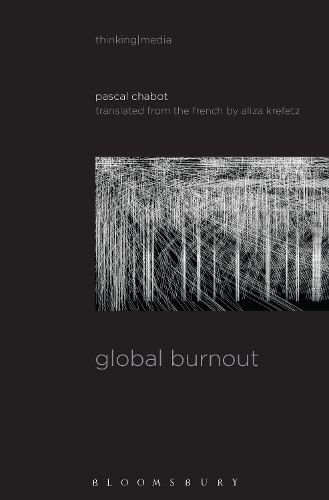
Global Burnout
(Hardback)
Available Formats
Publishing Details
Global Burnout
By (Author) Dr. Pascal Chabot
Bloomsbury Publishing PLC
Bloomsbury Academic USA
8th February 2018
United States
Classifications
Tertiary Education
Non Fiction
Media studies
Philosophy
Psychology
158.723
Physical Properties
Hardback
144
Width 140mm, Height 216mm
318g
Description
Available for the first time in English and freshly adapted as the acclaimed documentary Burning Out, Pascal Chabot's polemic treatise - Global Burnout - takes the phenomenon we call burnout as not just an individual problem that affects a few exhausted people, but rather 'a disease of civilization', connected to concepts of progress, technology, and desire, which are the hallmarks of this era of experimentation. First analysing the archaeology of the concept, Chabot distinguishes three main types of burnout: the first, specific to professions who help others, appears to be the exhaustion of their humanism; the second, a trouble of adaptation and perfectionism; and the third, which is a consequence of the struggle for recognition. The philosophical implications of each of these three states is identified, allowing Chabot to buck the trend towards a negative, nearly fatalistic outlook, something not surprising considering the intrinsic gravity of the subject matter. An excellent story teller as well as an adequate elaborater of complex theories, Chabot's Global Burnout presents an introduction to the topic and therapy for the modern reader.
Reviews
Burnout, stress, and depression have become worldwide epidemics. Calling burnout civilizations disease, Belgian philosopher Pascal Chabot has given us a fascinating and accessible history and theoretical framework of this modern crisis. He not only shows us how we got here, but also how we can use that knowledge to redefine success and truly thrive. * Arianna Huffington, HuffPost Founder and Founder & CEO of Thrive Global *
Fire and work are the forces at stake in our suicidally consumption-driven civilization, examined with penetrating depth by Pascal Chabot - whose contemplative approach stands out in an era where efficiency reigns and purpose is negated, struck down by a disruption that leads to madness, in the final phase of the phenomenon that Nietzsche called nihilism. -- Bernard Stiegler * head of the Institut de recherche et d'innovation, Centre Georges-Pompidou, France *
Its urgently relevant and superbly well-written and translated. Its readable and compelling....I love this book and the translation is beautiful. * Graeme Kirkpatrick, Head of Sociology, University of Manchester, UK *
Author Bio
Pascal Chabot is a lecturer of philosophy and communication at the Institute of Advanced Studies of Social Communications (IHECS) in Belgium. He is the author of The Age of Transitions (2015), The Seven Stages of Philosophy (2011), After Progress (2008) and Chabot le Robot (2016).
